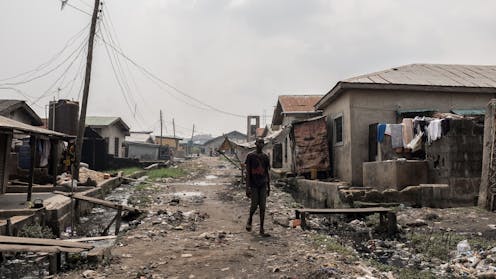
Urban slums news, research and analysis - the conversation
- Select a language for the TTS:
- UK English Female
- UK English Male
- US English Female
- US English Male
- Australian Female
- Australian Male
- Language selected: (auto detect) - EN
Play all audios:

May 18, 2025 Oluwaseyi Omowunmi Popogbe, _Crawford University _ Forced eviction is not a solution to the growth of slums. February 20, 2025 Bishal Bharadwaj, _Curtin University_; Peta
Ashworth, _Curtin University_, and Pramesh Dhungana, _Curtin University_ Burning plastic as fuel for cooking and heating releases toxic chemicals into the air and contaminates food. Yet this
is common in many parts of the world. April 21, 2024 Oluwaseyi Omowunmi Popogbe, _Crawford University _ Social inclusion gives slum dwellers a voice to advocate for their rights and
interests, leading to more inclusive and equitable policies and practices. January 19, 2024 Emma Ramsay, _Monash University_ Most of the 1 billion people in informal settlements are in the
tropics where the threat of humid heat is rising. Poor weather station coverage that misses local hotspots puts them even more at risk. September 8, 2023 Marie Huchzermeyer, _University of
the Witwatersrand_; Amira Osman, _Tshwane University of Technology_; Hannah le Roux, _University of the Witwatersrand_; Margot Rubin, _Cardiff University_; Matthew Wilhelm-Solomon,
_University of the Witwatersrand_; Mfaniseni Fana Sihlongonyane, _University of the Witwatersrand_; Neil Klug, _University of the Witwatersrand_; Philip Harrison, _University of the
Witwatersrand_; Priscila Izar, _University of the Witwatersrand_; Sarah Charlton, _University of the Witwatersrand_; Sarita Pillay Gonzalez, _University of the Witwatersrand_, and Tanya
Zack, _University of the Witwatersrand_ Armed police interventions are unconstitutional and incapable of addressing housing and safety in the inner city. January 19, 2022 Patrick Brandful
Cobbinah, _The University of Melbourne_ A new approach to urban planning is needed to restore hope in African cities. There are three keys that can help unlock this. September 12, 2021 Ozayr
Patel, _The Conversation_ The place names of Nairobi’s informal settlements offer a glimpse into the realities of people who live there. August 25, 2021 Patrick Brandful Cobbinah, _The
University of Melbourne_ and Michael Odei Erdiaw-Kwasie, _Charles Darwin University_ Ghanaian city authorities are focused on addressing problems of poverty, education and health rather than
managing green spaces in slums September 23, 2020 Jessica Kritz, _Georgetown University_ In cross-sector collaboration, communities and citizens articulate their needs and then partner with
governments and NGOs to address these self-identified problems. September 20, 2020 Patrick Brandful Cobbinah, _The University of Melbourne_; Ellis Adjei Adams, _University of Notre Dame_,
and Michael Odei Erdiaw-Kwasie, _University of Southern Queensland_ If we learn from COVID-19, there are three key areas to tackle to make cities safer from outbreaks of future infectious
diseases. August 30, 2020 Anindita Sarkar, _University of Delhi_ Despite high prices, poor quality and inconvenience, Kenya’s urban poor continued to buy water from private vendors because
it’s still their best option. July 29, 2020 Astrid R.N. Haas, _International Growth Centre_ and Victoria Delbridge, _International Growth Centre_ The demon is not density but rather that
African countries have not planned and made the investments necessary to manage the downsides of the type of density found in informal settlements. June 9, 2020 Redento B. Recio, _The
University of Melbourne_; Crystal Legacy, _The University of Melbourne_, and Kim Dovey, _The University of Melbourne_ Besides battling the coronavirus pandemic, San Roque residents have long
been locked in a bigger struggle for their very survival as a community in the face of home demolitions and relocations. May 20, 2020 Ishita Chatterjee, _The University of Melbourne_ Long
before the Indian government responded to the threat of COVID-19 with a lockdown, residents of Shivaji Nagar, with the support of a local NGO, were protecting and helping one another. May
12, 2020 David Sanderson, _UNSW Sydney_ Many are speculating about the pandemic changing how we plan and use our cities. What they overlook is how many people live in unplanned settlements
where it’s more likely to be business as usual. November 14, 2019 Henry F. (Chip) Carey, _Georgia State University_ From Santiago and La Paz to Beirut and Jakarta, many of the cities now
gripped by protest share a common problem: They’ve grown too much, too fast. July 31, 2019 Tanzil Shafique, _The University of Melbourne_ A community of 200,000 in Dhaka faces eviction to
make room for “development”. Is it time to rethink the concept, especially with a billion people now living in informal settlements worldwide? February 12, 2019 Hamilton Coimbra Carvalho,
_Universidade de São Paulo (USP)_ Brazil’s scorpion infestation, which is terrorizing residents of São Paulo and other major cities, is a classic ‘wicked problem.’ That means officials must
think outside-the-box to fix it. December 24, 2018 Sujeet Kumar, _Jawaharlal Nehru University _ Indians were promised they would be included in planning 100 smart cities and that everyone
would benefit. But many of the millions of slum residents have had no say in their homes being destroyed. November 20, 2018 Thaisa Way, _University of Washington_ Research shows that access
to urban green space makes people and neighborhoods healthier. But parks can’t work their magic if their design ignores the needs of nearby communities.
